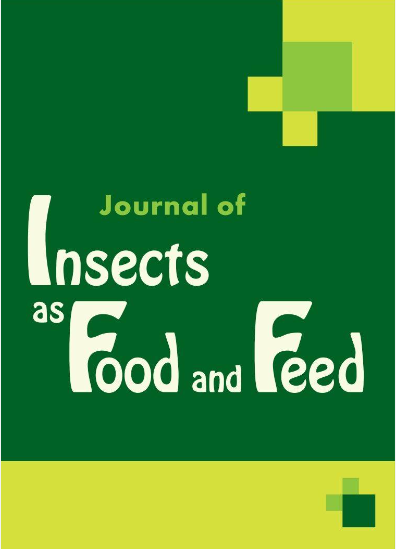Behaviour intention to eat reared crickets in Myanmar: the effects of trust, knowledge, and perceived quality
IF 3.5
3区 农林科学
Q1 ENTOMOLOGY
引用次数: 0
Abstract
Edible insects are a good source of proteins, fats, and micronutrients for human consumption. Crickets are one of the most widely reared insects worldwide. They require less capital spending and less space and water consumption while offering more food, employment, and income possibilities than conventional animal farming. Additionally, raising crickets may aid in achieving various sustainable development objectives. Although crickets are Myanmar’s most popular edible insects, a few farmers are presently rearing them. The farming business is not thriving as in other countries mainly because consumers primarily eat crickets collected from the wild. Using the extended theory of planned behaviour, this study identifies factors possibly impacting the intention to eat reared crickets in Myanmar, alongside perceived product quality, consumer knowledge, and trust in value chain actors. Data were collected through telephone interviews, resulting in a valid data set of 212 respondents from Yangon and Mandalay who recently ate crickets collected from the wild. The result of the structural equation modelling revealed that participants are ready to accept reared crickets as a food source. Consumption intention towards reared crickets is directly influenced by consumers’ attitudes, perceived behavioural control, and trust in producers. Concurrently, it is indirectly influenced by consumer knowledge of the environmental friendliness of cricket farming. Subjective norms, trust in retailers, and perceived product quality do not significantly affect the intention to eat crickets. As trust in producers is the new main predictive factor, cricket farmers should build public trust by giving transparency in the production process, thereby achieving a more favourable attitude towards reared insects, possibly leading to higher consumption levels.在缅甸食用饲养蟋蟀的行为意向:信任、知识和感知质量的影响
食用昆虫是蛋白质、脂肪和微量元素的良好来源,可供人类食用。蟋蟀是全世界最广泛饲养的昆虫之一。与传统的动物养殖相比,蟋蟀需要的资本支出更少,空间和水消耗更少,同时还能提供更多的食物、就业和收入机会。此外,饲养蟋蟀还有助于实现各种可持续发展目标。虽然蟋蟀是缅甸最受欢迎的食用昆虫,但目前只有少数农民饲养蟋蟀。养殖业不如其他国家兴旺,主要是因为消费者主要食用从野外采集的蟋蟀。本研究利用扩展的计划行为理论,确定了可能影响缅甸人食用饲养蟋蟀的意向的因素,以及感知的产品质量、消费者知识和对价值链参与者的信任。研究通过电话访谈收集数据,获得了来自仰光和曼德勒的 212 名受访者的有效数据集,这些受访者最近食用了从野外采集的蟋蟀。结构方程模型的结果显示,受访者愿意接受饲养的蟋蟀作为食物来源。消费者对饲养蟋蟀的消费意向受到消费者态度、感知行为控制和对生产者信任的直接影响。同时,消费者对蟋蟀养殖的环境友好性的了解也会间接影响消费意向。主观规范、对零售商的信任和感知的产品质量对食用蟋蟀的意向没有显著影响。由于对生产者的信任是新的主要预测因素,蟋蟀养殖者应通过提供生产过程的透明度来建立公众信任,从而获得对饲养昆虫更有利的态度,这可能会导致更高的消费水平。
本文章由计算机程序翻译,如有差异,请以英文原文为准。
求助全文
约1分钟内获得全文
求助全文
来源期刊

Journal of Insects as Food and Feed
Agricultural and Biological Sciences-Insect Science
CiteScore
7.00
自引率
17.60%
发文量
133
期刊介绍:
The Journal of Insects as Food and Feed covers edible insects from harvesting in the wild through to industrial scale production. It publishes contributions to understanding the ecology and biology of edible insects and the factors that determine their abundance, the importance of food insects in people’s livelihoods, the value of ethno-entomological knowledge, and the role of technology transfer to assist people to utilise traditional knowledge to improve the value of insect foods in their lives. The journal aims to cover the whole chain of insect collecting or rearing to marketing edible insect products, including the development of sustainable technology, such as automation processes at affordable costs, detection, identification and mitigating of microbial contaminants, development of protocols for quality control, processing methodologies and how they affect digestibility and nutritional composition of insects, and the potential of insects to transform low value organic wastes into high protein products. At the end of the edible insect food or feed chain, marketing issues, consumer acceptance, regulation and legislation pose new research challenges. Food safety and legislation are intimately related. Consumer attitude is strongly dependent on the perceived safety. Microbial safety, toxicity due to chemical contaminants, and allergies are important issues in safety of insects as food and feed. Innovative contributions that address the multitude of aspects relevant for the utilisation of insects in increasing food and feed quality, safety and security are welcomed.
 求助内容:
求助内容: 应助结果提醒方式:
应助结果提醒方式:


